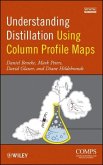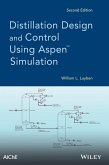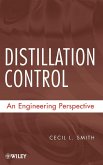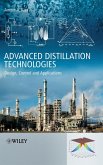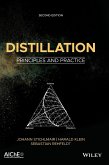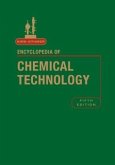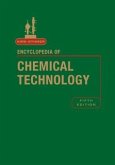Hands-on guidance for the design, control, and operation of azeotropic distillation systems
Following this book's step-by-step guidance, readers learn to master tested and proven methods to overcome a major problem in chemical processing: the distillation and separation of azeotropes. Practical in focus, the book fully details the design, control, and operation of azeotropic distillation systems, using rigorous steady-state and dynamic simulation tools.
Design and Control of Distillation Systems for Separating Azeotropes is divided into five parts:
Fundamentals and tools
Separations without adding other components
Separations using light entrainer (heterogeneous azeotropic distillation)
Separations using heavy entrainer (extractive distillation)
Other ways for separating azeotropes
The distillation methods presented cover a variety of important industrial chemical systems, including the processing of biofuels. For most of these chemical systems, the authors explain how to achieve economically optimum steady-state designs. Moreover, readers learn how to implement practical control structures that provide effective load rejection to manage disturbances in throughput and feed composition.
Trade-offs between steady-state energy savings and dynamic controllability are discussed, helping readers design and implement the distillation system that best meets their particular needs. In addition, economic and dynamic comparisons between alternative methods are presented, including an example of azeotropic distillation versus extractive distillation for the isopropanol/water system.
With its focus on practical solutions, Design and Control of Distillation Systems for Separating Azeotropes is ideal for engineers facing a broad range of azeotropic separation problems. Moreover, this book is recommended as a supplemental text for undergraduate and graduate engineering courses in design, control, mass transfer, and bio-processing.
Following this book's step-by-step guidance, readers learn to master tested and proven methods to overcome a major problem in chemical processing: the distillation and separation of azeotropes. Practical in focus, the book fully details the design, control, and operation of azeotropic distillation systems, using rigorous steady-state and dynamic simulation tools.
Design and Control of Distillation Systems for Separating Azeotropes is divided into five parts:
Fundamentals and tools
Separations without adding other components
Separations using light entrainer (heterogeneous azeotropic distillation)
Separations using heavy entrainer (extractive distillation)
Other ways for separating azeotropes
The distillation methods presented cover a variety of important industrial chemical systems, including the processing of biofuels. For most of these chemical systems, the authors explain how to achieve economically optimum steady-state designs. Moreover, readers learn how to implement practical control structures that provide effective load rejection to manage disturbances in throughput and feed composition.
Trade-offs between steady-state energy savings and dynamic controllability are discussed, helping readers design and implement the distillation system that best meets their particular needs. In addition, economic and dynamic comparisons between alternative methods are presented, including an example of azeotropic distillation versus extractive distillation for the isopropanol/water system.
With its focus on practical solutions, Design and Control of Distillation Systems for Separating Azeotropes is ideal for engineers facing a broad range of azeotropic separation problems. Moreover, this book is recommended as a supplemental text for undergraduate and graduate engineering courses in design, control, mass transfer, and bio-processing.


